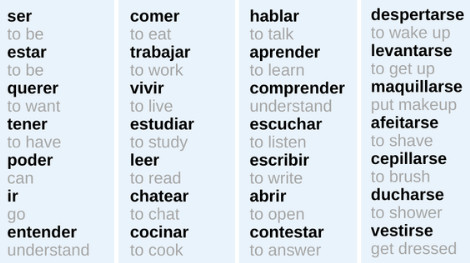verbs
Latest stories
More stories
-
35 Views
in Culture, Mexico, Table of Expressions, TranslationMe Cayó el 20. 10 expressions that are not so easy to figure out (8)
by
Admin updated
Here are 10 common random idioms you may have trouble with if you hear them for the first time: Expression Approximate literal translation (what you might think you actually heard) Explanation ni loco, ni loca neither crazy no way. (Not even if I were crazy) ¿no que no? no that not?, not that not? not […] More
-
67 Views
in Grammar, Translation, VocabularyDesconocer
by
Admin updated
Every Spanish language student knows that there are two verbs that mean to know, saber and conocer. This is true in other Romance languages as well. What many students don’t know is that we have a verb with the opposite meaning: desconocer. The main meaning of desconocer is to not know, but it could […] More
-
41 Views
in Culture, Grammar, Table of Expressions, Translation, VocabularySí se puede. The other Spanish YES
by
Admin updated
We have a YES that English doesn’t use. This sí is used to contrast two opposite ideas, to confirm something, or to eradicate doubts about something. Spanish English (literal translations, ungrammatical English) A mí no me gusta cantar, pero sí me gusta escuchar música Singing is not pleasing to me, but YES listening to […] More
-
50 Views
in Grammar, Table of Expressions, Translation, VocabularyTalking about rodents, a very unusual Spanish verb.
by
Admin updated
Talking about rats and mice, do you know why they are called rodents? Because they roen. In Spanish, roer means to gnaw. They are roedores because they roen. This is the only Spanish verb I can recall that has 3 different choices for the present yo form. In the present tense, this verb is […] More
-
67 Views
in Culture, Grammar, Translation, VocabularyEntender Vs. Comprender
by
Admin updated
Entender and comprender both mean to understand. Although comprender is very popular among students, natives don’t use it as much. The reason comprender is so popular among beginner students and tourists is that comprender is a regular verb so it’s taught before entender, which is a stem-changing verb. Many students quit Spanish before even […] More
-
64 Views
in Culture, Mexico, News, Translation, VocabularyNew Spanish verbs are mostly -ar
by
Admin updated
In Spanish, one way to classify verbs is by their endings, -ar, -er, and -ir. In a few years, the -ar verbs will be the big majority. The reason is that almost every new verb that is being incorporated into the language is always -ar. Many of these verbs come from either English or […] More
-
33 Views
in Grammar, Table of ExpressionsSpanish verb tenses terminology
by
Admin updated
In English, you say present perfect, but in Spanish we say pretérito perfecto, antepresente, and in the U. S. people also call it presente perfecto, These differences happen usually between Latin America and Spain, and sometimes between schools, like instituto Cervantes and Columbia or NYU. Here is a table showing these name differences. Example English […] More











